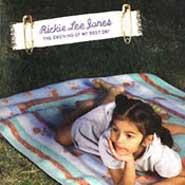Rickie Lee Jones Returns A Winner
Even if you generally find Jones's voice too nasal, too cat-like, too small, too thin, too whiney and especially too nasal, her cool, slinky and smartly laid-back vibe on this impeccably arranged and played double LP set will surely win you over.
The set is musically eclectic, though filtered through a unifying 70's/80's sensibility. Jones's bossa nova “Bitchenostrophy” is reminiscent of an old CTI Record. The wah-wah drenched “Little Mystery,” has whiffs of Barry White, and aromas of Willie Mitchell, with some disco mixed in. The second track, “A Second Chance,” is a Steely Dan tribute complete with a reference to “Countdown to Ecstasy.”
There's dreamy, acoustic guitar constructed folk (“Sailor Song”), melancholic Continental theatrics (“A Tree on Allenford”), the Lindsay Buckingham-ish “It Takes You There,” a blues (“Mink Coat At the Bus Stop”), an introspective slice of musical Americana (the title track) and gospel rave-up “(Tell Somebody [to repeal the Patriot Act),” the title of which tells you that while the music has a retro-feel, the sentiments are up to date. The album opener, “Ugly Man,” is about George Bush, and Jones makes it very personal.
The arrangements are deftly and diversely drawn, and the playing mesmerizing to the point where on occasion the backing tracks step forward, reducing Jones' sometimes distant musical persona to more of an observer than a participant. I think that was purposeful on Jones's part, but perhaps I'm projecting.
The mix of musicians is eclectic too, including Mike Watt, David Hidalgo, Pete Thomas, Ben Harper, Grant Lee Philips, and Syd Straw.
Sonically, its Pro Tools all the way, so while the studio—The Village Recorder—is good old-school, and the peripheral gear was probably first class, don't expect an analog listening experience, or anything close. It's a spacious, crystal clear, fundamentally sound recording, with startlingly good dynamics and sharp transient relief, but there's also the Pro-Tools (or Pro-Tools related) gauzy overlay and dry, hardened edges. Actually it's more of a pernicious musical infection than a mere overlay, though I'm sure the Pro-Tool partisans will say it's "transparent."
Though the mix is skillful, especially as it tries to both layer instruments in space and leave plenty of breathing room between them, there's also a flatness to the images—not all of them—that prevents them from exhibiting the “breath of life,” great recordings can deliver.
Speaking personally, though I've never been a big Ricky Lee Jones fan, though most people I know are, this record has sold me on her. It's adult-smart, skillfully and thoughtfully written, arranged and performed, and at least acceptable sonically. I haven't heard the CD, but if this was sourced from an 88.2/24 bit file, I'm sure it, like Smile will sound better than the CD edition, despite the recording's digital origins.



